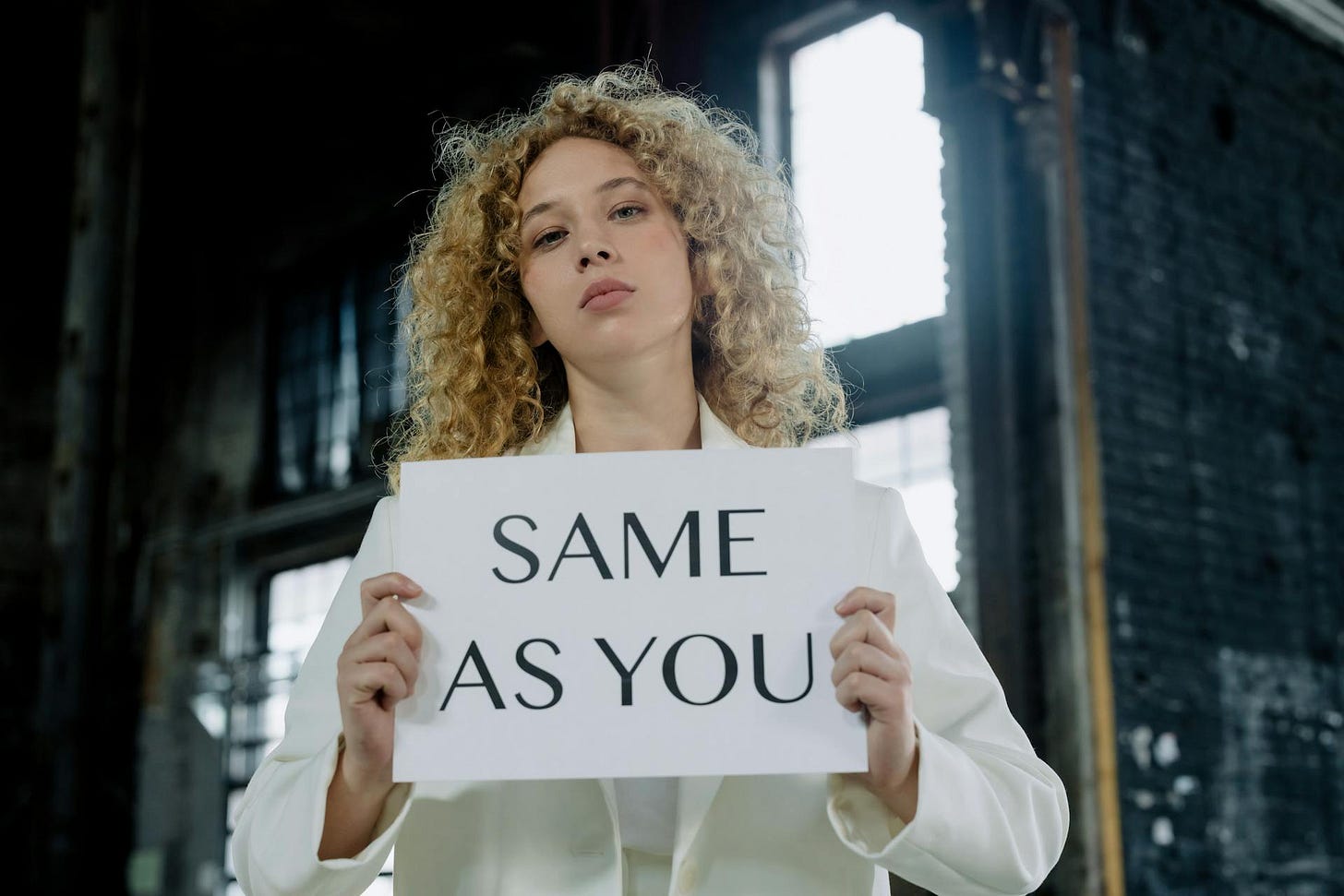Social Justice for People Over 45
Because you don’t have time left to waste it on social media
Photo by cottonbro studio
My book - “Bob and Alice - an anti-love story” is pre-order. It comes out Nov 15!
❤️Bob and Alice takes readers on a thrilling journey through the lives of two high-performing individuals, each grappling with love, fear, and ambition amid the relentless world of tech startups and international intrigue.🌎
Between high-stakes missions and private moments, Bob and Alice unveils a powerful truth: relationships flourish when both partners carry the weight, trusting each other’s strength in moments of vulnerability.
📘Get it here !
Introduction
Do you want a more natural, nuanced way of connecting with people?
Or are you happy with noise, violence and algorithms?
In this edition of Anti-Design Patterns, I’ll explore how social media has both accelerated the speed of information and diminished its quality, creating a near-zero standard of depth in communication. Our dependence on platform algorithms resembles a form of addiction, drawing us into an endless cycle of buying and selling.
But what if AI could help us find clarity—a way to connect more naturally, with nuance, in our conversations?
The Speed of Social Media
There are over 3 billion users on Facebook, 2.7 billion on YouTube, 1 billion on TikTok, 1 billion on LinkedIn, and 500 million on X. Millions of people, drawn to real-time updates on every imaginable topic, consume these platforms incessantly.
Whether you get your news from X or CNN, the speed of updates has accelerated from daily newspapers 30 years ago to sub-second notifications today. The lines between traditional news sites like Fox, CNN, or Ynet in Israel, and social platforms like X, have blurred. Even in real life, conversations often echo updates from social media, and information is seldom shared directly from person to person. The role of websites is fading; today, setting up a social media profile is all you need to establish a presence.
The Algorithms Are Programming Us
Platform algorithms are optimized for growth—and advertising revenue. This has two key consequences:
Creators depend on these algorithms for content distribution.
Consumers receive content filtered to maximize engagement.
Follower counts have become proxies for a creator’s “importance,” leading us to unconsciously value content from those with more followers. This bias extends to wealth and physical beauty—people react to appearance and status, consciously or not.
Social media, therefore, has its own hierarchy:
Attractive people do well.
Attractive, wealthy people do better.
Attractive, wealthy people with large followings do best.
Attractive, wealthy people with large followings and a connection to trendy topics like crypto outperform all.
In an experiment, I reverse-searched a few profile pictures and found some were fake. We might be engaging with a 14-year-old in Karachi who’s pretending to be a crypto influencer by using images of Ukrainian models.
We are, in effect, programmed by algorithms, followers, visuals, and trends.
The Maelstrom of Buying and Selling
At some point, social media transformed into a sales marketplace. Today, on LinkedIn or X, it feels like the Shuk (market) in Jerusalem, where sellers surround you on all sides.
The influencer and creator economy has grown rapidly but still isn’t the largest market. Global crypto, valued at $2.51 trillion, is up 8.58% from yesterday, and the creator economy is projected to reach $528.39 billion by 2030. This is why I believe X will soon expand into crypto trading, and when that happens, social media will become an even more aggressive marketplace. The Shuk in Jerusalem will feel like a quiet retreat by comparison.
AI’s Real Gift: Small AI, Not Gen AI
The speed and algorithm-driven content of social media don’t enhance our quality of life. Nor do follower counts, wealth, or physical beauty.
AI’s true contribution could lie in helping us choose who and what we engage with, rather than letting platforms decide for us. Imagine an AI that understands your needs and provides you with tailored content—not what’s trending, but what’s meaningful for you.
After the recent U.S. Presidential election, social media exploded with polarized reactions. @elonmusk tweeted:
“Huge thank you to everyone who supported this platform and our mutual quest to support freedom of speech! The people voted for major government reform!”
Meanwhile, Martin Gutmann posted on LinkedIn:
“Is there any positive, hopeful way to interpret this? I'm finding it hard to think of one. Starting January 20, misogynists, racists, and authoritarians--in the US and across the world--will feel more emboldened and more legitimized. The world will be more dangerous and more chaotic. This is (it both saddens and scares me to say) a relative certainty.”
I admire both Martin Gutmann, a professor at HSLU Lucerne who writes about leadership, and Elon Musk for his achievements and his support for free speech on X, despite the noise.
My AI could allow me to learn from both Gutmann and Musk—and give us a more natural, nuanced way to connect with people.



There are certainly many aspects of social media, and many problems. Especially, as you indicate, that the news inflow from these platforms has been selected by algorithms, and that the success is skewed - not everybody has a real chance.